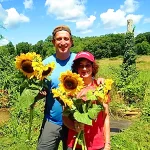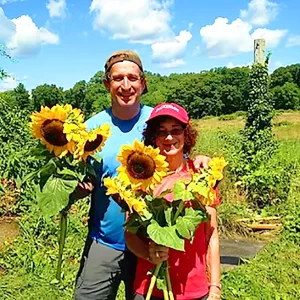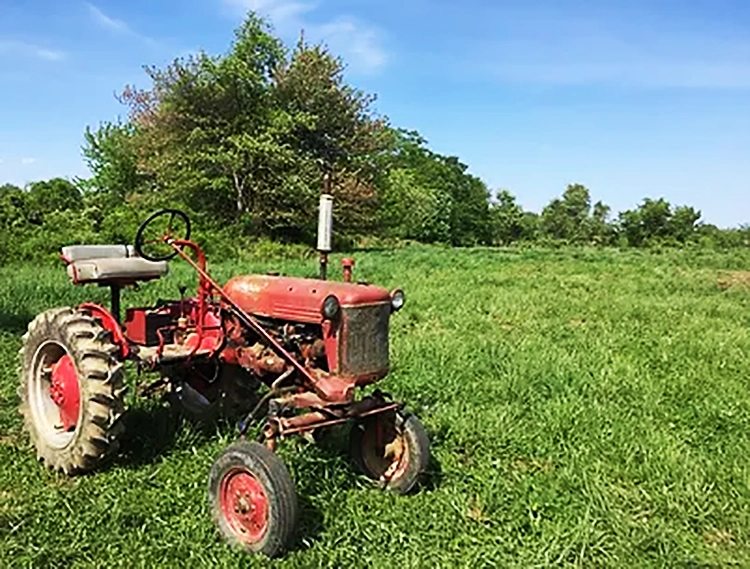
By Elissa Ely
Choosing a favorite vegetable or melon, if you happen to be Farmer Tim Carroll, is like choosing a favorite child. If he’s eating a cantaloupe from his farm, cantaloupe is his favorite. When he’s eating a cherry tomato, the cantaloupe steps aside. “I’m not a fennel guy,” he says, but with such respect that no fennel could resent him.
There are dozens and dozens of vegetable children in Farmer Tim’s world. Since 2015, his Dudley, MA, farm has grown multiple varieties of up to 50 kinds of produce each August through October. The season starts aboveground with an act of faith; community-supported agriculture (CSA) customers in Belmont, Watertown, Newton, and Dudley buy their farm shares. Those who can’t afford regular prices can buy Solidarity Shares—augmented by full-paying customers—or use SNAP cards and the Healthy Incentive Program for funding.
So begins the process of CSA symbiosis; customers feed Tim’s farm financially, and, months later, his farm feeds them literally. When conditions are agreeable (and some conditions are beyond human control), 50 to 100 pounds of locally purchased seeds become 25,000 to 50,000 pounds of food. “The plants want to grow,” Tim says, simplifying what is surely a complicated process. “Just get out of their way.”
For 20 weeks, three days a week, boxes are packed on the farm (“They crank up the tunes and pack 90 boxes in less than an hour,”) with six to nine kinds of vegetables per box. All those favorite children are moved out of the soil and into farmer’s markets—in Belmont, on Concord Avenue every Sunday afternoon. And because more food is intentionally grown than can be sold, the excess goes to food pantries in Belmont and Watertown, thousands of pounds each year. “Hunger is a problem I can’t solve,” Tim says. “But I’m growing food. I can do a little bit.”
He did not start out on a farm. He started out in Southern California, the son of a trucker who “chased where the work was.” As a child, he thought he might want to become a garbageman. In the little boy’s view, “they rode on a big truck and only worked one day a week.”
Instead, in high school, he discovered chemistry. “This is magic,” he remembers. “You can change matter.” Despite sensible trepidation about the temperatures, he moved to the frigid Northeast and got his PhD. Research followed, including creating a compound that became the premiere nuclear medicine drug for decades.
Eventually, research evolved into research management, marketing, and business development, which required returning to school at night for an MBA. As the head of operations for Merck in Boston, Tim was “in charge of everything in the building except the science.” Operations moved into finance, and finally, into financial planning analysis for biotech companies. Financial skills and science knowledge in a single person is like being bilingual.
Meanwhile, there was a backyard garden in Belmont for Tim’s son and daughter. It started as one raised bed and grew to 13. The kids loved the peas and carrots, and Tim did all the weeding. Gardening took hold. His daughter’s college application essay described how her life was not so different from the life of a tomato plant.
When the kids moved up and out, it was the father who struggled with an identity crisis. “I looked out my backyard,” Tim recalls. “What do I want to do with the rest of my life? I grow food. Wouldn’t it be cool to really grow food? Being the person I am, I took a course.”
As he discovered, through classes and then through a quarter acre of practice land (not unlike a postdoctoral position for farmers), gardening is not farming. “Both grow vegetables,” he says. “That’s where it ends. What’s reasonable in a garden isn’t reasonable on a farm.” You cannot weed a farm by hand, and you cannot run a tractor through a garden. For that matter, a dozen carrots are not 5,000. “I was doing square-foot gardening,” he says. “I had to learn on scale.”
In 2015, the commitment was solidified: he bought 92 acres of a former dairy farm in central Massachusetts. Here was quintessentially New England land: shallow soil, rocky, “not a flat part on the entire property—and compacted by 200 years of hoofs.” Nine years later, rocks are still harvested as often as vegetables.
The first year, working on half an acre, Tim grew food for 12 CSA members. Most were friends. “They were pity purchases.” This year, growing on what will be more like 10 acres, there are more than 200 CSA members.
Many CSA members know he uses no GMO seeds, minimizes fossil fuels (one small gas tractor, one small diesel tractor), rotates crops to avoid pests, and uses living mulch like hairy vetch and rye to prevent erosion. There are no chemical pesticides, herbicides, or fertilizers.
Sometimes, this approach runs the risk of losing a crop. Two years ago, potato beetles in a drought killed off the potatoes early—“then they went after the eggplant, and that made us mad . . . but on the other hand, we had terrific tomatoes.” This is where a box of CSA produce can be like a hand of poker. It requires the long view—next month, different bounty.
Farming is science and finance (“farm spreadsheets are just as complex as spreadsheets for biotech businesses”), and also philosophy. “A farmer is the ultimate expression of optimism,” Tim says. A farmer has to believe that his seeds will become food. A farmer knows that he can’t control life, but he can control the response. Optimism has reached out of the rocky land and into this particular farmer. “If all of us in this crazy world are looking for affirmation,” he says, “you can’t do better than being a vegetable farmer. Just walking on the property, I feel better. This weekend, I’m picking up a manure spreader.”
Elisa Ely is a community psychiatrist.




Sorry, the comment form is closed at this time.